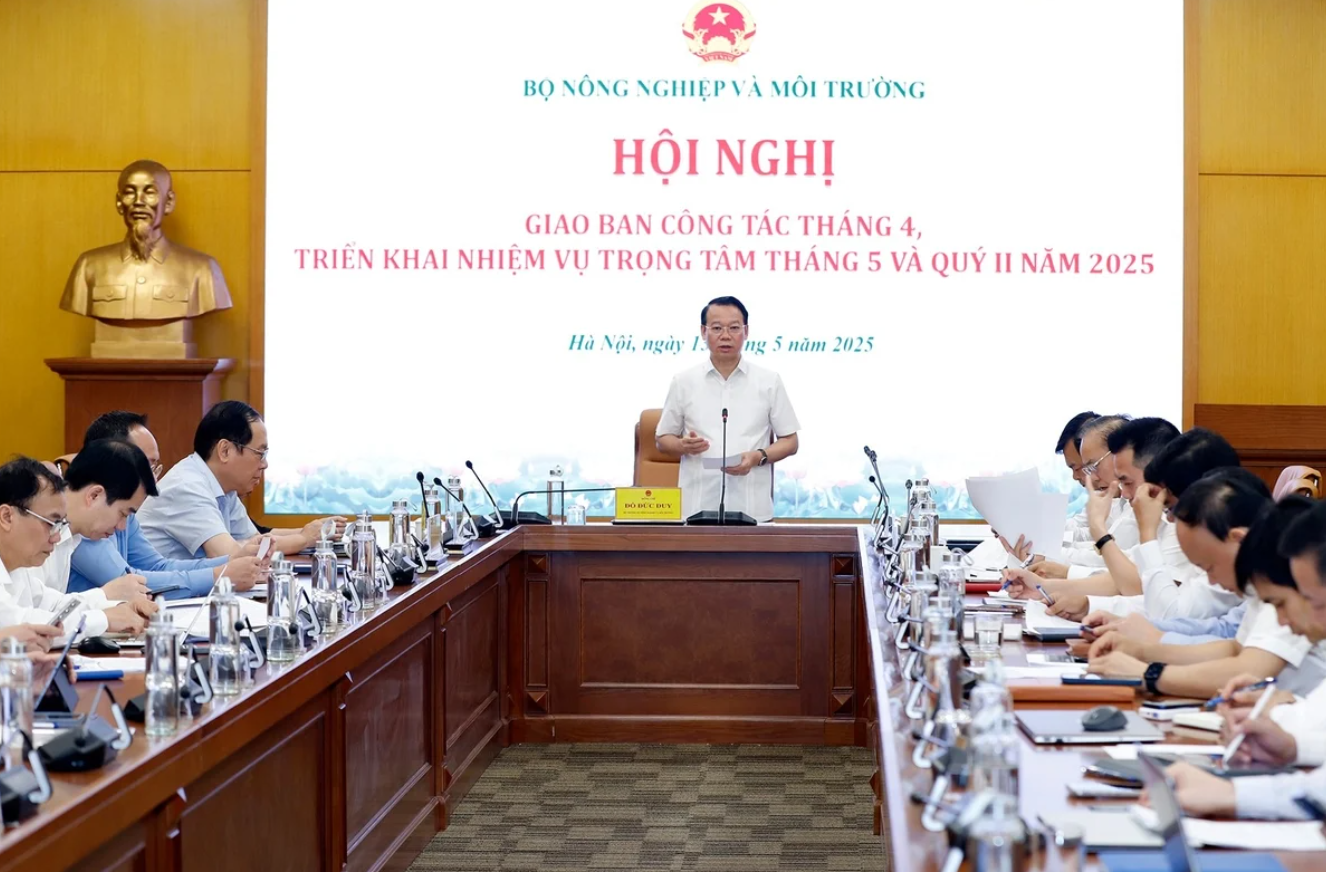On the morning of May 13, the Ministry of Agriculture and Environment held a monthly briefing to review April's performance and outline key tasks for May and the second quarter of 2025. Minister Do Duc Duy and Deputy Ministers chaired the meeting, emphasizing the robust recovery and growth of the agriculture and environment sectors—key drivers of national economic development.
Agricultural recovery and export surge
Minister Do Duc Duy reported that in Q1/2025, the added value of the agriculture, forestry, and fisheries sectors grew by 3.74%—the highest rate in recent years for the same period, surpassing the government’s assigned target. Specifically, agriculture grew by 3.53%, forestry by 6.67%, and fisheries by 3.98%. These figures signal a strong recovery in the agricultural sector, providing a solid foundation for broader economic growth.
Export turnover for agricultural, forestry, and fishery products in the first four months of 2025 reached USD 21.25 billion, a 10.7% increase compared to last year. Of this, agricultural products accounted for USD 11.6 billion (+11.7%), forestry products USD 5.56 billion (+11.2%), and fishery products USD 3.09 billion (+13.7%). Livestock products and agricultural inputs also saw notable growth, reaching USD 178 million and USD 722 million, respectively.
 Minister Do Duc Duy chairs the meeting. Photo: Khuong Trung.
Minister Do Duc Duy chairs the meeting. Photo: Khuong Trung.The Minister stressed that if this growth momentum continues and tariff issues - especially with the U.S. market - are resolved soon, the 2025 export target of USD 65 billion is achievable. Agriculture remains a crucial pillar of Vietnam’s trade surplus, posting a USD 5.18 billion surplus in Q1. Although slightly down from last year's period, this figure is still higher than the national average.
Challenges and sustainable development solutions
Despite the positive outcomes, Minister Do Duc Duy warned that significant challenges remain. Exports of durians, which brought in USD 3.2 billion in 2024, have slowed due to quarantine-related issues, with current exports reaching only about 20% of the 2025 target. Additionally, crop pests, animal diseases, and prolonged drought conditions further hinder agricultural production.
The ongoing restructuring of local government administration has also impacted the implementation of irrigation projects and land clearance, affecting sectoral development progress.
In light of this, the Minister called on departments and units to seriously assess the current situation, confront difficulties head-on, and propose practical, realistic solutions to ensure the timely execution of key tasks in May, Q2, and the first half of 2025.
“Agriculture is the key driving factor of the economic growth. Without strong determination and bold solutions, it will be difficult to meet our targets,” he emphasized.
Boosting public investment and administrative reform
Regarding public investment, the Ministry has allocated more than VND 20.786 trillion to key projects, with a disbursement rate of 16.3%—higher than the national average. This reflects strong leadership and determination in executing core tasks to enhance production capacity and respond to climate change.
Administrative reforms have also been prioritized, with over 346,000 applications received and processed, achieving a completion rate of 97.6%, including 99.8% of cases resolved on time - greatly benefiting businesses and citizens.
Organizational restructuring within the Ministry has been effectively implemented, reducing the number of units by 24.19% to build a lean, efficient apparatus while maintaining operational continuity and staff welfare.
In the coming period, the Ministry will focus on organizing the Party Congress at all levels and the Ministry’s Party Congress for the 2025–2030 term. Concurrently, it aims to accelerate the finalization of legal frameworks to support the two-tier government model, to be completed by June 30, 2025.
The sector will also promote breakthroughs in science, technology, innovation, and digital transformation while enhancing its capacity for international integration, especially as potential U.S. reciprocal tax policies could impact exports.
The Ministry remains committed to simplifying administrative procedures and creating a favorable environment for businesses to thrive—helping sustain and elevate the long-term growth of the agriculture and environment sectors.